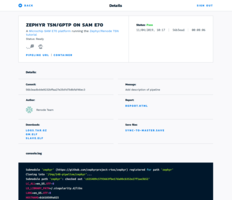New Renode Framework Support for Rapid Prototyping, Development and Testing of Real-life Systems
Press Release Summary:

- Available with a range of developer-oriented features such as state saving and replaying, fine-grained hooks and events, comprehensive tracing and multi-core debug
- Enables efficient hardware/software co-design approach within a seamless environment, improving time to market and expanding potential user base
- Help engineers to develop software in a high inspectable environment, debug interactively and create suites of tests resulting in increased software quality
Original Press Release:
QuickLogic and Antmicro Announce Renode Framework Support for EOS S3 SoC
San Jose, Calif., Dec. 11, 2019 /PRNewswire/ -- QuickLogic Corporation (NASDAQ: QUIK), a developer of ultra-low power multi-core voice-enabled SoCs, embedded FPGA IP, and Endpoint AI solutions, and Antmicro, a high-tech company focusing on introducing open technologies to modern edge computing systems and a RISC-V ecosystem leader, today announce that Renode, Antmicro's open source functional simulation framework for heterogeneous embedded systems, now has initial support for QuickLogic's EOS™ S3 Sensor Processing Platform. This support enables a more efficient hardware/software co-design approach within a seamless environment, improving time to market, and expanding the potential user base for the EOS S3 SoC.
Renode is a simulation-based open source development framework for rapid prototyping, development and testing of real-life systems. It is deterministic and binary compatible with the target hardware, and comes with a range of developer-oriented features such as state saving and replaying, fine-grained hooks and events, comprehensive tracing, multi-core debug, simple and runtime-loadable platform definitions, and Python support.
Renode's free and open source support for the EOS S3 platform aims to include a broad range of the platform's peripherals, from basic controllers such as UART and GPIO, through the interrupt subsystem, I2C and SPI interfaces, to microphone input support and innovative HDL co-simulation capability. The framework's capability to co-simulate SoC and FPGA components with Verilator, or to connect blocks running in physical eFPGAs to enable a "divide-and-conquer" HW/SW co-design philosophy, resonates perfectly with the hybrid SoC FPGA nature of the EOS S3 platform.
"With Renode as part of their everyday toolchain, engineers are able to develop software in a highly inspectable environment, debug interactively (even in multi-node scenarios) and create suites of tests resulting in increased software quality and reduced time-to-market,'' said Michael Gielda, VP business development at Antmicro.
"Our overarching strategy with this relationship is to significantly broaden the served available market for our EOS S3 SoC by enabling hardware development with a more software-centric approach," said Brian Faith, president & CEO of QuickLogic. "This initial release of Renode support for EOS S3 is the first of several planned open source deliverables resulting from a joint development effort between Antmicro and QuickLogic."
About EOS S3 Sensor Processing Platform
The EOS S3 Voice and Sensor Processing Platform is an ultra-low power SoC that combines always-on/always-listening voice processing with fast, efficient and sophisticated sensor processing capabilities. It includes a proprietary, patent-pending uDSP-like Flexible Fusion Engine (FFE) that handles the bulk of the sensor algorithm processing, which minimizes the processing load for the floating point MCU. The multi-core design of EOS S3 enables it to be used as a host processor as well as a companion co-processor. Power consumption in the always-listening mode is minimized by its hardware integrated Low Power Sound Detector (LPSD). System-level power consumption is further optimized by the EOS S3's dynamic power management technology.
Availability
Initial support for the EOS S3 Sensor Processing Platform is fully open sourced on Renode's GitHub. The EOS S3 models released today enable running RTOS-level software in the EOS S3 processing system, communication over UART, and come with an easily adapted example setup. To learn more about the capabilities of Antmicro's open source Renode software development framework, visit renode.io or write to contact@renode.io.
About Antmicro
Antmicro is a software-driven tech company developing modern edge AI systems for various branches of industry. Antmicro provides applied R&D for customers worldwide, offering assistance in prototyping, new product development and adoption of modern embedded technologies, both in the hardware and software areas. Antmicro's projects involve a broad range of open source technologies such as RISC-V, Renode, Zephyr, TensorFlow, ROS, Linux and Android. Antmicro is a Platinum Founding Member of the RISC-V Foundation, as well as a member of the Linux Foundation, Zephyr Project and CHIPS Alliance.
About QuickLogic
QuickLogic Corporation (NASDAQ: QUIK) is a fabless semiconductor company that develops low power, multi-core semiconductor platforms and Intellectual Property (IP) for Artificial Intelligence (AI), voice and sensor processing. The solutions include embedded FPGA IP (eFPGA) for hardware acceleration and pre-processing, and heterogeneous multi-core SoCs that integrate eFPGA with other processors and peripherals. The Analytics Toolkit from our recently acquired wholly-owned subsidiary, SensiML Corporation, completes the end-to-end solution with accurate sensor algorithms using AI technology. The full range of platforms, software tools and eFPGA IP enables the practical and efficient adoption of AI, voice and sensor processing across mobile, wearable, hearable, consumer, industrial, edge and endpoint IoT. For more information, visit www.quicklogic.com and https://www.quicklogic.com/blog/.
Source QuickLogic Corporation
Contact:
Andrea Vedanayagam, Veda Communications, 408.656.4494, pr@quicklogic.com
Web Site: http://www.quicklogic.com




